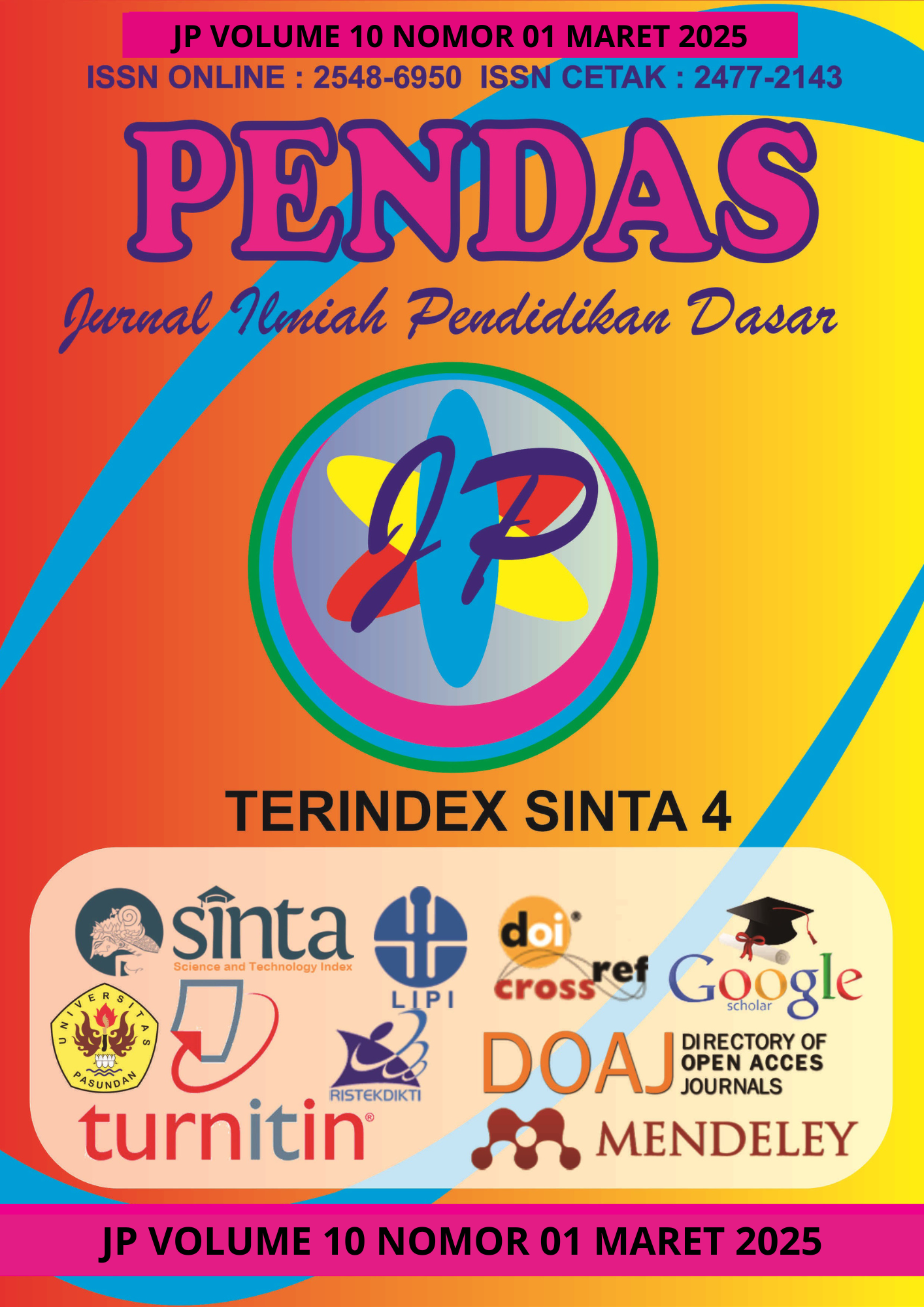EARLY DATING IN DIGITAL NATIVE ERA: DAMPAK KONTEN DIGITAL TERHADAP FENOMENA TREN PACARAN DINI GEN ALPHA DI SEKOLAH DASAR
DOI:
https://doi.org/10.23969/jp.v10i01.22032Keywords:
early dating, digital content, social media, character education, teacher and parent collaborationAbstract
Various challenges in character education in elementary schools come along with digitalization, including the phenomenon of early dating carried out by the alpha generation in elementary schools. They are digital natives who are inseparable from the digital content that is increasingly consumed. As a result, they have a tendency to imitate adult behavior, in this case dating. This study attempts to highlight the impact of digital content on the phenomenon of the early dating trend of the alpha generation in elementary schools. The method used is a phenomenological study with a qualitative approach, with data collection techniques in the form of interviews with 34 subjects, observation, and documentation. The data collection was carried out in three schools with their own characteristics but with one link, namely digitalized schools, whether in cities, transition areas or villages. The results show that providing access to digitalization for children also brings digital content that triggers early dating behavior at elementary school age. Including creating the content itself. Various follow-up problems also arise such as decreased focus on learning, emotionality, and even violating religious rules. In this context, character education and guidance from elementary school teachers and parents are very necessary. In conditions on the ground, several strategies and solutions have been and will be implemented, such as monitoring, digital protection, religious education, sexual education, and collaborating with external parties. In conclusion, early dating is an unavoidable phenomenon in the digital era, but schools and families can collaborate together in preventing and handling it.
Downloads
References
Asosiasi Penyelenggara Jasa Internet Indonesia. (2024). SURVEI PENETRASI INTERNET INDONESIA 2024.
Creswell, J. W. (2014). Penelitian Kualitatif & Desain Riset: MEMILIH DI ANTARA LIMA PENDEKATAN (3rd ed.). PUSTAKA PELAJAR.
Dari, T. S. U., & Ratnawati, D. (2015). HUBUNGAN POLA ASUH ORANG TUA DENGAN PERILAKU BERPACARAN PADA REMAJA DI SMAN 6 DEPOK.
Fernando, Z. J., Abdi, M., Utami, R. A., & Putra, D. A. (2021). Perlindungan Anak terhadap Kekerasan dalam Berpacaran (Dating Violence). University of Bengkulu Law Journal, 6(1), 82–98.
Gulatee, Y., Pagram, J., & Combes, B. (2018). Which tech will i use? Trends in students’ use and ownership of technology in a thai university, an ongoing study. Journal of ICT Research and Applications, 12(2), 138–153. https://doi.org/10.5614/itbj.ict.res.appl.2018.12.2.3
IPSOS. (2024). IPSOS EDUCATION MONITOR 2024 A 30-Country Ipsos Global Advisor Survey.
JPPI. (2024). DATA KASUS KEKERASAN DI LEMBAGA PENDIDIKAN 2024 (Tingkat Pendidikan Dasar dan Menengah). Jakarta. Retrieved from www.new-indonesia.org
Lidiawati, K. R., Simanjuntak, E. J., & Dewi, W. P. (2020). PSIKOEDUKASI PENDIDIKAN SEKSUALITAS: “LOVE, SEX AND DATING” PADA REMAJA. Konferensi Nasional Pengabdian Kepada Masyarakat Dan Corporate Social Responsibility, 3, 440–445. Tangerang: Universitas Multimedia Nusantara.
Mudjijanti, F. (2010). MASA PACARAN DINI (EARLY DATING) DAN DAMPAKNYA. Widya Warta: Jurnal Ilmiah Universitas Katolik Widya Mandala Madiun, 34(01), 47–87.
Nurfadhilah, Sa’diyah, R., Achmad, N., & Hilowle, S. (2022). PENGETAHUAN PELAJAR SEKOLAH DASAR TENTANG PUBERTAS DI JAKARTA DAN SEKITARNYA. Jurnal Kesehatan Reproduksi, 13(2), 99–106.
Prensky, M. (2001). Digital Natives, Digital Immigrants Part 1. On the Horizon, 9(5).
Purnamasari, R. (2019). HUBUNGAN KEDEWASAAN DINI DAN PERILAKU PACARAN TERHADAP KEMATANGAN EMOSI PELAJAR SEKOLAH DASAR. Jurnal Tunas Bangsa, 6(1).
Riyanto, A. (2021). TANGGUNG JAWAB ORANG TUA PADA ANAK ERA DIGITALISASI DALAM PERSPEKTIF HUKUM KELUARGA ISLAM (STUDI KASUS DESA JEBUNG KIDUL KECAMATAN TLOGOSARI KABUPATEN BONDOWOSO) (Skripsi). INSTITUT AGAMA ISLAM NEGERI JEMBER, Jember.
Rusnali, A. N. A. (2021). Alpha Generation and Digital Literacy for the Future of the Nation. Palakka: Media and Islamic Communication, 2(2).
Sahronih, S. (2018). IMPLEMENTASI NILAI-NILAI PENDIDIKAN KARAKTER DALAM MENGATASI DEGRADASI MORAL ANAK SEKOLAH DASAR DI ERA DIGITAL. Seminar Dan DiskusiNasional Pendidikan Dasar 2018, 2528–5564.
Sekretariat GTK Kemdikdasmen. (2024, November 7). Enam Program Prioritas Kemendikdasmen. Retrieved November 10, 2024, from Kementerian Pendidikan Dasar dan Menengah website: https://gtk.kemdikbud.go.id/read-news/enam-program-prioritas-kemendikdasmen
Sulistyawati, A., & Lindawati. (2018). FAKTOR-FAKTOR YANG BERHUBUNGAN DENGAN PERILAKU BERPACARAN PADA ANAK SEKOLAH DASAR. Jurnal Ilmu Kebidanan, 4(2), 102–109.
Umulaili, I. E., Putri, T. Z., & Khoirot, U. (2016). PENGARUH TEKNOLOGI TERHADAP PERUBAHAN SIKAP ANAK SD (SUDAH MENGENAL MAKE-UP, PACARAN, DAPAT MENGENDARAI SEPEDA MOTOR) DAN MOTIVASI BELAJAR. Jurnal Ilmu Sosial, 43(2).
Downloads
Published
Issue
Section
License
Copyright (c) 2025 Pendas : Jurnal Ilmiah Pendidikan Dasar

This work is licensed under a Creative Commons Attribution 4.0 International License.














































